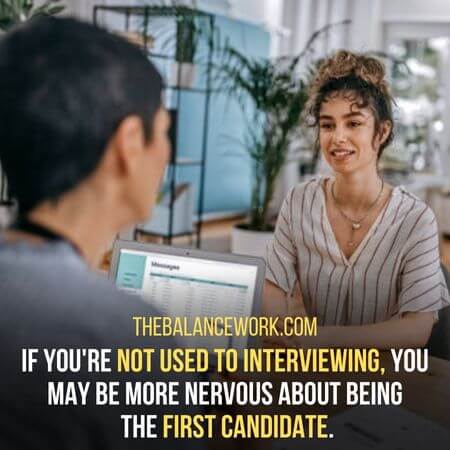Is it better to interview first or last? The answer to this question depends on the company’s culture and the specific job you are applying for.
The interview process is designed to help employers evaluate candidates for a job.
Is It Better To Interview First Or Last?
The first step in the process is usually the resume screening. It’s followed by the phone screen and the,n finally, the in-person interview.
Some companies may place more emphasis on resume screening. And some companies may skip it altogether.
The phone screen determines if candidate has the basic qualifications for the job.
The in-person interview is usually the last step in the process. And it is used to assess the candidate’s qualifications and fit for the job.
So the question is, should you interview first or last? First, let’s find out the pros and cons of each approach.
5 Advantages To Interview First
Here are five reasons why it might be advantageous to interview first:
1. Primary Bias:
Who would you rather hire? The candidate who interviewed first or the one who interviewed last?
The answer is probably the latter. But, again, this is due to the primacy bias.
Primary bias is the tendency to place more importance on the information presented first.
For instance, people get asked to read two descriptions of a job candidate. So, they will rate the candidate good if they read the positive information first.

The primacy effect causes us to remember the first piece of information better than the second.
Thus, if you give a great first impression, they may remember you positively.
And with some luck, you might land the job.
2. The “Halo” Effect:
The halo effect is the tendency to view someone in an overly positive light based on one favorable trait.
For example, you think someone is smart. You might also think they are good-looking and funny.
While the halo effect can work in your favor, it can also backfire. For example, the interviewer may write you off if you appear arrogant or condescending.
So when it comes to interviews, it’s best to err on caution. Be polite and humble.
Interviewing at first can allow you to make a good impression and set the tone for the rest of the interviews.
3. Interviewers Will Be More Relaxed:
The interviewer will be more relaxed if you’re the first interviewee of the day. But, again, this is because they have yet to talk to candidates all day and are fresh.
You can use this to your advantage by being friendly and engaging. Ask the interviewer about their day.
Make small talk before diving into the questions. This will help put the interviewer at ease and make them more likely to like you.
When the interviewer is relaxed, they’re more likely to see your best qualities.
4. You Can Control The Conversation:
You can control the conversation if you’re the first interviewee of the day. You can set the tone and decide how long the interview will be.
You can do that if you want to chat and get to know the interviewer.
If you want to get straight to business and ask questions, you can do that too.
And you can’t control how the other candidates will interview. But if you make a good impression, the interviewer will be more likely to compare you favorably to them.
5. You Can Make A Lasting Impression:
Interviews can be forgettable. If you want to make sure the interviewer remembers you, go first.
You’ll be the freshest in their mind. And you can make sure your energy and excitement about the role carry through.
Plus, if you nail the interview, the interviewer won’t have anyone else to compare you to.
You want them to remember you as the best candidate they talked to that day.
And with so many candidates to interview, you want to make sure you stand out.
3 Disadvantages To Interview First
There are a few disadvantages to being the first candidate the interviewer sees that day.
1. You May Be Nervous:
If you’re not used to interviewing, you may be more nervous about being the first candidate.
The interviewer will likely sense your nerves. And it could affect the outcome of the interview.

Your nerves may also affect how you answer questions.
When it is your turn to ask questions, you may have a hard time thinking of any because you’re so nervous.
2. You May Be In A Hurry:
You may be in a hurry if you have another job to get to or somewhere to be.
You may need to give the interviewer more attention. For instance, you may be thinking about the next interview or your current job.
Or your mind may be elsewhere. This can affect how you answer questions and make a bad impression.
Some experts recommend scheduling your interviews for the beginning of the day.
If something comes up, you can reschedule it for another day.
3. Interviewer May Not Be Fully Prepared:
The interviewer may need more preparation if you’re in the first-day interview.
They may have needed to review your resume thoroughly. Or they may have yet to think of good questions to ask.
As a result, the interview may be shorter than usual. And it may need to be more informative and productive.
With that said, there are also drawbacks to being the last interview of the day.
3 Advantages Of Interview Last
Here are five advantages to being the last interview of the day:
1. You Will Have An Idea Of What To Expect:
If you’re the last interview of the day, you will have an idea of what to expect.
You will know how long the interview will be and what questions they asked.
The other candidates who interviewed before you will have set the tone for the day.

And before you go in, you will have the opportunity to speak with them and get their feedback.
You can also ask the receptionist or administrative assistant about the day’s interviews.
2. You Will Be More Relaxed:
If you’re on the last day’s interview, you will be more relaxed because you will know what to expect.
You won’t have the added pressure of being the first interviewee and setting the tone for the day.
The other candidates will have already broken the ice. And you can use their energy to your advantage.
When you’re more relaxed, you’re more likely to do better in the interview.
3. You Can Leave On A High Note:
If you’re the last interviewee, the interviewer may remember you when making decision.
You have the chance to leave a lasting impression. For instance, the interviewer asked you a difficult question.
You can take a few minutes to think about it and give a well-thought-out answer.
Or, if the interviewer seems to be running out of questions, you can ask them questions about the role or company. But, again, it will show you’re truly interested in the position.
3 Disadvantages To Interview Last
Let’s look at the disadvantages of being the last interview of the day.
1. Interviewer May Get Tired:
While you may be more relaxed than the last interviewee, the interviewer may get tired. This could work in your favor. But on the other hand, the interviewer may be more likely to let their guard down.
And if they’re tired, they may not be as focused, which means you have a better chance of standing out.
For example, you could ask more detailed questions. Or you could share a relevant story that the interviewer didn’t think to ask.
2. You May Get Forgotten:
If the interviewer sees several candidates in a row, there’s a chance they may start to blend.
So the interviewer may only remember you if you’re the last candidate they speak to.
But this isn’t necessarily a bad thing. For example, the interviewer liked your qualifications. They might be more likely to overlook any forgetfulness.
3. You May Get Judged More Harshly:
If you go last, the interviewer may be more critical of you.

This is because the interviewer will have just seen the best candidate. And they will compare everyone else to that person.
And with whole day work, the interviewer may dwell on any negative aspects of your interview.
Their standards may be higher, and they may be more likely to find fault with you.
Verdict: Is It Better To Interview First Or Last?
So, is it better to interview first or last? The answer may depend on the situation.
If you have a choice and feel confident, go first.
But if you’re feeling nervous or the interviewer seems tired, it may be better to go last.
In any case, be ready to give the best interview you can, no matter when you’re scheduled.
Also, remember that the most important thing is not when you interview but how you interview.
Preparation and practice can help you ace any interview, whether it’s the first or last.
Final Word:
There are both advantages and disadvantages to interviewing first or last.
So you can ask the employer which would be best for you, or you can choose one and go with it.
But in the end, the most important thing is to do your best and be ready.
Last Updated on 1 month by Shahzaib Arshad
- Why Does My Boss Wink At Me? 6 Potential Reasons - October 5, 2023
- Is It Legal For Your Employer To Call Your Doctor? No, But… - October 4, 2023
- 12 Ways To Deal With A Low IQ Person - September 22, 2023